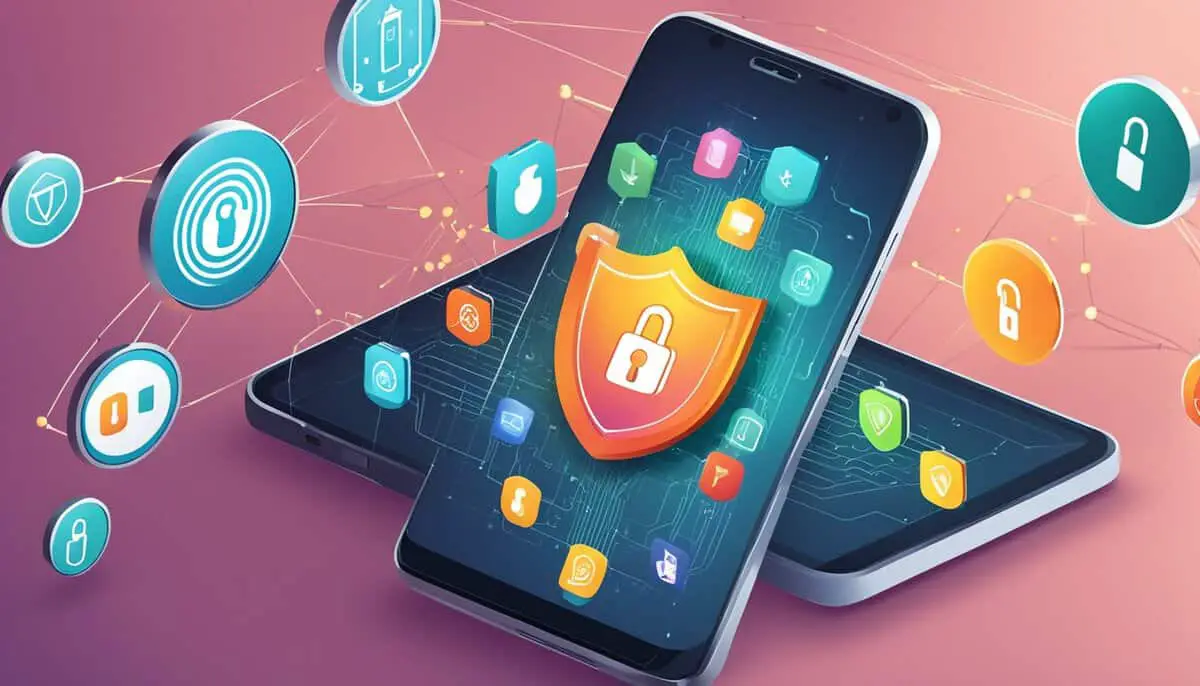Wondering how to keep your smartphone safe from digital threats? You’re in the right place.
Essential security apps for smartphones can shield your device from viruses, theft, and privacy invasions. These tools are no longer optional but necessary for maintaining your phone’s health and your peace of mind.
Antivirus apps like Bitdefender and Avast offer top-notch protection, scoring perfectly in recent tests. Tools like these safeguard your phone from malware and can even help you find a lost device. Anti-theft features allow you to remotely lock or wipe your phone, adding an extra layer of security.
On the privacy side, apps such as Orbot help you browse safely by encrypting your internet traffic. These tools ensure that your personal data remains private.
Key Takeaways
- Security apps are crucial for smartphone protection.
- Antivirus apps like Bitdefender and Avast provide comprehensive security.
- Privacy tools like Orbot help maintain your data privacy.
Decoding Mobile Security

Knowing what threats exist and how your Android device’s security works can keep your phone safe. You need to understand the various types of malware and phishing methods, as well as the security measures within the Android operating system.
Understanding Threats: Malware to Phishing
Your Android device faces a wide array of cyber threats. Malware is a big one and can include viruses, ransomware, spyware, and adware. These malicious programs can steal data, lock your phone, or flood it with ads. Phishing is another threat. Hackers send fake emails or messages that look legit, trying to trick you into sharing personal information or downloading malware.
To defend against these threats, you should install a security app that offers strong malware protection. Some good options are BitDefender Mobile Security and Avira Antivirus Security. These apps scan your device for malicious software and help protect your personal information. Always be cautious of unexpected messages or emails and avoid clicking on suspicious links.
The Anatomy of Android Security
Android devices use several security measures to keep you safe. The built-in Google Play Protect scans apps in the Google Play Store for malware and removes harmful apps from your device. It’s like having a watchdog that keeps an eye on your apps.
Encryption is another key element. It protects your data by encoding it, so only you can access it with the right key or password. Many security apps offer enhanced encryption features to further secure your information. The Orbot app is a great tool for browsing privately, using Tor to encrypt your internet traffic.
Finally, the Android OS allows for regular updates, which patch security bugs and add new protections. Make sure your device is always running the latest updates to stay secure.
Essential Security Apps for Your Mobile Arsenal
When it comes to keeping your smartphone secure, choosing the right apps is crucial. Let’s dive into some of the best antivirus apps and VPN tools to make sure your phone stays protected and your privacy intact.
Top Antivirus Apps You Can Trust
Finding the right antivirus app is key to protecting your phone from malware and malicious threats. Here are some top options:
Norton Mobile Security: Known for its high detection rate, Norton offers real-time protection and can even scan your device for vulnerabilities. It also includes anti-theft features and web protection.
Bitdefender Mobile Security: This app provides excellent malware detection and performance. Bitdefender offers features like web protection, anti-theft, and app lock.
AVG: AVG Antivirus offers robust malware detection alongside extra features like a phone tracker, app locker, and photo vault to keep your files secure.
Avast: Avast includes a variety of security features including virus scanning, malware protection, and a junk cleaner to boost performance.
McAfee Mobile Security: McAfee’s mobile app offers comprehensive protection, including anti-theft, security lock, and Wi-Fi security check.
Choosing any of these apps will ensure that your mobile device is shielded against the latest threats, keeping your data safe.
Guarding Privacy with VPNs and Proxies
VPNs and proxies not only protect your data but also keep your online activities private. Here are some of the best you can use:
NordVPN: NordVPN ensures high levels of privacy with its no-log policy and robust encryption. It also offers Threat Protection to block malware and ads.
ExpressVPN: Known for its fast speeds, ExpressVPN encrypts your internet traffic, ensuring no one can spy on your online activities. It also provides user-friendly apps.
CyberGhost: This VPN is great for beginners, offering straightforward apps and strong privacy features. It also has a no-log policy and dedicated servers for streaming.
ProtonVPN: ProtonVPN offers strong security features, including end-to-end encryption and perfect forward secrecy. It’s ideal for privacy-focused users.
Private Internet Access (PIA): PIA provides robust security features, including a strict no-log policy, and supports multiple devices.
Using any of these VPNs or proxies ensures that your online activities remain private and your data secure, no matter where you are.
Optimizing Your Device’s Performance and Usability

Proper optimization of your smartphone or tablet not only makes it more efficient but also extends its overall lifespan. It’s important to understand how to manage both battery life and storage, as well as configurations relating to app permissions.
Battery Life and Storage Strategies
Managing your device’s battery life starts with understanding how apps and settings affect it. Keep your phone’s software up-to-date for the latest optimizations. Lower your screen brightness and use Wi-Fi instead of cellular data when possible to save on battery.
Storage efficiency is another key aspect. Uninstall apps you don’t use, and regularly clean up unnecessary files and cache. Cloud storage can free up space on your device but make sure you have access to a reliable internet connection when relying on cloud solutions.
Battery saving tips:
- Disable background app refresh.
- Turn on battery saver mode.
- Monitor battery usage in the settings to identify power-hungry apps.
Storage management tips:
- Use tools like Google’s “Files” app to clean junk files.
- Move photos and videos to cloud storage or an external drive.
- Use SD cards for additional storage if your device supports it.
Navigating App Permissions and Settings
It’s crucial to understand the permissions apps request and to manage them appropriately. Some apps ask for permissions they don’t actually need. For instance, a flashlight app asking for access to your contacts raises a red flag.
Examining permissions:
- Go to settings and navigate to the permissions manager.
- Revoke permissions that seem unnecessary.
- Regularly audit app permissions to ensure your privacy is maintained.
Settings adjustments:
- Disable permissions for location and camera for apps that don’t need them.
- Turn off notifications for non-essential apps to reduce clutter.
- Adjust background data usage settings to optimize performance and save on battery.
By maintaining a strict check on permissions, not only do you protect your privacy but also enhance your device’s usability and performance.
Advanced Tools for Enhanced Mobile Protection
To keep your smartphone even more secure, consider using advanced tools like app locks, photo vaults, and encrypted messaging apps. These tools provide extra layers of privacy and security that go beyond basic antivirus and anti-theft protection.
The Benefits of App Locks and Photo Vaults
App locks are handy for preventing unauthorized access to sensitive apps. They allow you to set a separate password for specific apps, so even if someone has your phone, they can’t open those protected apps without your permission. This is especially useful for apps containing personal or financial information.
Photo vaults work similarly by securing your private photos and videos. They keep your media hidden and encrypted, making it accessible only through the vault app, usually protected by a password or fingerprint. This ensures that your personal moments remain private.
These tools are easy to use and can be basic yet effective additions to your mobile security arsenal. For even more robust protection, consider combining app locks and photo vaults with other security apps like Norton 360 or McAfee Mobile Security.
Secure Communication with Encrypted Messaging
For truly private conversations, encrypted messaging apps are essential. One of the most well-known secure messaging apps is Signal. It uses end-to-end encryption to ensure that your messages can only be read by you and the recipient. This means that even if someone intercepts your message, they won’t be able to read it.
Encrypted messaging apps often include features like disappearing messages and screen security, which further enhance privacy. They also offer voice and video call encryption, providing comprehensive protection for all forms of communication.
Using these apps helps keep your conversations secure from hackers and unauthorized access, ensuring your privacy is maintained at all times.
Balancing Security with Accessibility: Features and Costs

When choosing security apps for your smartphone, it’s crucial to find a balance between protecting your device and making sure the app is user-friendly. Here’s what you should consider regarding value and support.
Assessing the Value for Money in Security Apps
You need to evaluate the value for money of any security app. Many apps offer free trials, but the real test comes with subscription plans. For example, some Android security apps come with various pricing tiers. A basic plan might be free or low-cost, but premium features such as advanced antivirus scanning and anti-theft tools often come with a higher price tag.
Look closely at what each tier offers. Some plans include extra features like privacy tools or real-time protection. Compare those offerings with the price and see if the premium version really provides extra value.
Customer Support and Service: The Safety Net
Good customer support is essential for any mobile security app. When things go wrong, you want quick and effective help. Some apps provide 24/7 support through different channels like live chat, email, or phone.
It’s also worth checking user reviews for feedback on support services. Look for words like responsive, helpful, and quick. Efficient support not only fixes issues but can also provide guidance on using advanced features, making your subscription worthwhile. Reliable customer service ensures that you’re never left in the lurch, adding peace of mind to your security investment.

